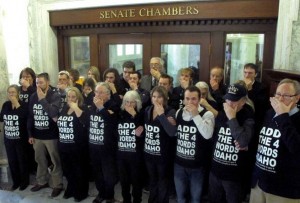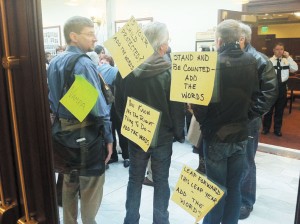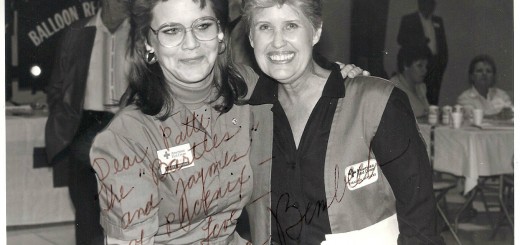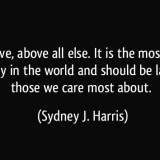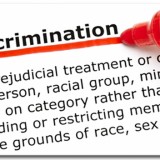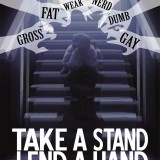Do we need laws to fight discrimination? Yes we do
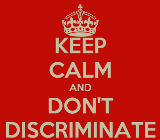 A friend posted a lovely statement on her Facebook page last week which said, “Instead of making more government laws, let’s raise a generation that doesn’t discriminate.”
A friend posted a lovely statement on her Facebook page last week which said, “Instead of making more government laws, let’s raise a generation that doesn’t discriminate.”
It’s a nice idea, one that perhaps every generation has hoped for, but being the flawed humans that we are, we haven’t yet found the magic formula to make it happen since the beginning of time.
Add The Words Idaho
This Facebook post coincided with a final vote on Idaho’s “Add the Words” bill, which asked the state legislature to approve adding four words — “sexual orientation” and “gender identity” — to the existing Idaho Human Rights Act. The bill basically would protect citizens against being fired, evicted or refused services because they are gay or transgender or perceived to be as such.
Because everyone has a sexual orientation of one type or another (including heterosexual) the bill would in fact protect anyone who was discriminated against due to their sexual orientation or perceived orientation. (e.g., you are straight, but your boss thinks you’re gay and wants to get rid of you. He can fire you).
Add the Words supporters had tried for nine years just to get a hearing in front of the legislative committee. All they wanted was to be heard, to provide information and testimony about what it is like to live in Idaho and be gay or transgender.[pullquote]It may be true that the law cannot change the heart but it can restrain the heartless. ~ MLK, Jr.[/pullquote]
During this almost decade of petitioning, Add the Words supporters protested silently in the State Capitol halls and got arrested again and again. They stuck post-it notes to legislators office doors pleading with them to call a hearing. All they wanted was for the state legislators to listen to the stories of Idahoans who have lost jobs and housing, been beat up, and refused public services because of who they are.
Some people believe we don’t need laws to legislate how we treat others. But, as the Rev. Martin Luther King, Jr., noted in an address at Western Michigan University, December 18, 1963:
“It may be true that the law cannot change the heart but it can restrain the heartless. It may be true that the law cannot make a man love me but it can keep him from lynching me and I think that is pretty important, also. So there is a need for executive orders. There is a need for judicial decrees. There is a need for civil rights legislation on the local scale within states and on the national scale from the federal government.” (read the full quote here).
Finally a hearing after almost a decade
In January 2015, a hearing was finally called and several hundred people turned out to testify and tell their stories. Heart wrenching accounts of discrimination blended with supportive testimonies by the Chief of Police, religious and business leaders, pleas by parents, teenagers, and gay and transgender people from all walks of life. Some people risked their livelihoods to publicly testify in front of the committee.
The religious objectors quoted scripture and said how their daughters and wives would be in danger of sexually confused predators who would now be able to use the girl’s bathroom and perhaps molest them. They expressed fear that the law would allow necrophilia, beastiality, pedophilia and more. They felt that being gay was a ‘choice’ and extending protections to that group would infringe on their their own religious rights (ironically, a person’s religion is already one of the most sacred rights protected by the U.S. Constitution, and the Civil Rights Act of 1964).
9 years of waiting, 21 hours of testimony, 13 votes to kill it
After 21 hours of gut-punching testimony, legislators voted to keep the bill in committee which effectively killed it for the rest of this session. Its demise came straight down party lines – four Democrats voted to move it forward for a vote, 13 Republicans voted to kill it. Supporters will regroup and go back again next year for the 10th year.[pullquote]…the law cannot make a man love me but it can keep him from lynching me…MLK, Jr.[/pullquote]
So, now, back to my friend’s Facebook post. Raising a non-discriminating generation is a nice thought, but as long as there are people who think it’s okay to restrict the rights of people who are different, we’re going to see those beliefs and ideas continue to be passed along through time.
And that is why laws are needed.
How many generations are we willing to wait?
I was born and raised in the South, and I remember an early life that included segregation and the undertone that people of the black community were not quite the same or equal to the white majority. A sentiment like, “Let’s just raise a generation that doesn’t discriminate,” definitely would not have led to a change in the bigotry in the country at that time, but the passage of the Civil Rights Act of 1964 sure made an impact.[pullquote]…laws make it clear that discrimination against other human beings will not be tolerated..[/pullquote]
No, the law didn’t make everyone suddenly love each other, but it helped to “restrain the heartless.”
Like MLK, Jr. noted, no law, including Add the Words, is going to make anyone accept others in their heart, but laws make it clear that discrimination will not be tolerated, legally or otherwise. And sometimes, that is the first step to changing the way a person operates.

